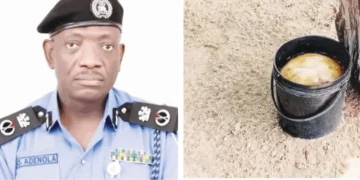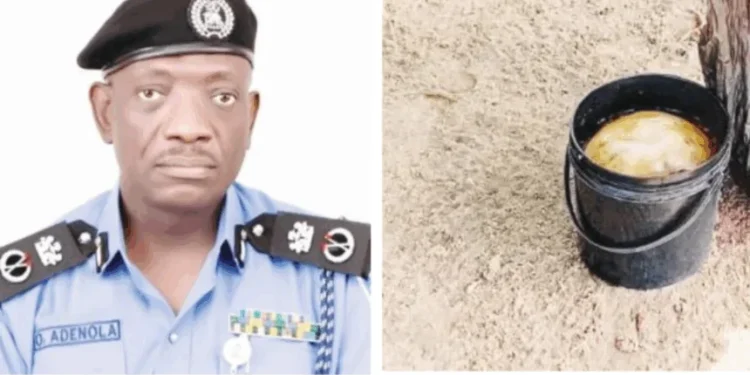One of the three individuals arrested by the Oyo State Police Command for allegedly trafficking human body parts, Ogundele Tajudeen, has confessed to purchasing and using the parts for personal rituals and reselling them to others. According to Tajudeen, he typically bought fingertip-sized human bones for around N1,000 and used them in rituals intended to bring financial gain. He claimed the charms he created sometimes brought him between N10,000 and N30,000 in returns.
According to reports from the Nigerian Tribune, Tajudeen, along with two others—Lukman Aseeke and Isaac Aderemi Ashamu—was apprehended by the Command’s Monitoring Unit following intelligence reports linking Tajudeen to the sale of human remains. The state Commissioner of Police, Johnson Adenola, ordered a swift investigation, leading to the suspects’ arrest.
The Monitoring Unit, led by ACP Olusola Aremu, placed Tajudeen under surveillance and raided his residence on April 26. During the search, police found two containers containing what appeared to be human flesh and body parts, including one with a tattoo bearing a name and date of birth.
During questioning, Tajudeen admitted to having clients who purchased the parts for ritual purposes and confessed to personally using the parts for similar aims. He revealed that Lukman introduced him to the trade and asked him to help sell the body parts, prompting the police to arrest Lukman.
Lukman, in turn, claimed he obtained the parts from Isaac Aderemi Ashamu. When questioned, Ashamu said he sourced the remains from a man known only as Oluwo, who is currently at large.
In an interview, Tajudeen shared that he is a 46-year-old herbalist from Ovo Town, married with five children, and works as a farmer and gardener in Oyo West Local Government. He recounted how Lukman gave him the containers on April 23, claiming he would return to collect them. Tajudeen explained that he would grind the bones with herbs to produce charms and claimed modest financial results, earning small sums but never acquiring wealth. He admitted that using human bones implied someone’s death but insisted he had never committed murder.
Lukman, 53, a traditional worshipper from Oyo with two wives and seven children, also confessed to involvement in the human parts trade. He explained that he turned to Ashamu after being advised by a late elder herbalist to use human flesh for charms. Lukman said he initially only wanted a small quantity for N5,000, but received a larger amount than expected. Unable to keep it, he contacted Tajudeen to collect it. Lukman maintained he only handed over one container and denied knowledge of the second container containing human breasts, which led to a dispute between him and Tajudeen during their interrogation.
Lukman also alleged that Tajudeen had long been involved in the trade, and claimed they had once visited the same herbalist who prepared a ritual charm for them. While the charm had no effect for Lukman, Tajudeen reportedly benefited, receiving increasing numbers of clients and earning between N30,000 and N100,000. Lukman said this motivated him to return to Ashamu for more supplies.
Ashamu, 41, a native of Ife Odan in Osun State and father of five, confirmed his participation in the trade. He said he and Lukman had been acquainted for three years, though they drifted apart after his wife expressed suspicion about Lukman’s activities. She was unaware that Ashamu himself was involved in the business. He explained that he later procured human flesh from a man known as Apènà Ajé, who reportedly traveled from Ekiti State with human body parts for sale. Ashamu admitted that acquiring such items necessarily involves someone’s death, and said that poverty drove him into the trade three years ago. He has been practicing as a native doctor for nine years.
Commissioner Adenola stated that investigations are ongoing, including efforts to locate the fugitive suspect. He also urged the public to avoid engaging in such heinous acts and emphasized the importance of upholding the dignity and sanctity of human life.















